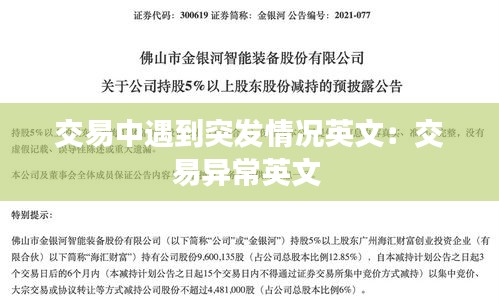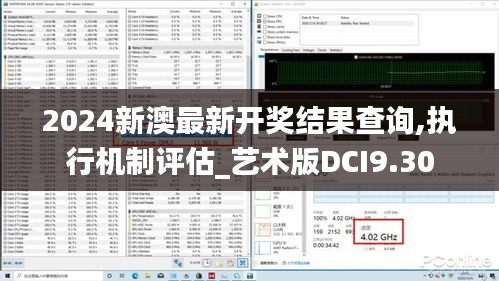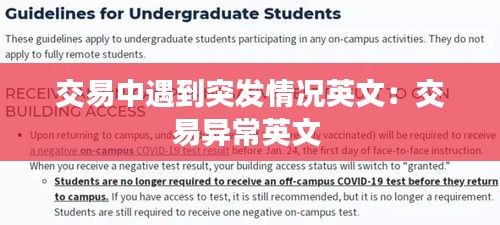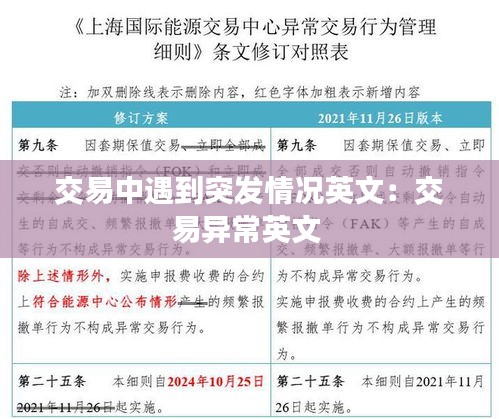Introduction to Trading and Unexpected Situations
Trading in financial markets can be both exciting and challenging. It involves analyzing market trends, making informed decisions, and managing risks. However, no matter how well-prepared a trader may be, unexpected situations can arise that can disrupt the best-laid plans. In this article, we will explore some common unexpected situations that traders may encounter and how to navigate through them effectively.
Market Volatility and Sudden Price Movements
One of the most common unexpected situations in trading is market volatility. Sudden price movements can occur due to various factors such as economic news, geopolitical events, or even unexpected corporate earnings reports. These events can lead to rapid changes in market sentiment, causing prices to swing wildly.
Traders need to be prepared for such volatility by setting stop-loss orders to limit potential losses and by using leverage cautiously. It's also important to stay calm and not react impulsively to sudden price changes. Instead, traders should take a moment to reassess their positions and adjust their strategies if necessary.
System Glitches and Technical Issues
Technical issues can occur at any time, and they can range from minor disruptions to complete system outages. These issues can prevent traders from accessing their accounts, executing trades, or receiving timely market updates.
Traders should have contingency plans in place to deal with technical issues. This might include having access to alternative trading platforms or using mobile apps to monitor their positions. It's also crucial to regularly back up trading data and have a clear understanding of the broker's procedures for resolving technical issues.
Unexpected Economic Events
Economic events, such as interest rate changes, inflation reports, or employment data releases, can have a significant impact on the markets. Sometimes, these events can be unexpected, leading to sudden shifts in market dynamics.
Traders should stay informed about upcoming economic events and be prepared for their potential impact. This involves keeping an eye on economic calendars and understanding how different economic indicators can influence market sentiment. When unexpected economic events occur, traders should quickly analyze the situation and adjust their positions accordingly.
Regulatory Changes
Regulatory changes can be a source of unexpected situations in trading. Governments and regulatory bodies often implement new rules or modify existing ones, which can affect trading conditions and strategies.
Traders need to stay updated with regulatory news and be ready to adapt their trading practices. This might involve adjusting leverage limits, changing trading hours, or even ceasing to trade in certain instruments. It's important to have a flexible trading plan that can be easily modified in response to regulatory changes.
Personal Emergencies
While not directly related to market conditions, personal emergencies can also disrupt trading activities. Health issues, family problems, or other unforeseen circumstances can require traders to take a break from their trading activities.
Traders should have a plan in place for such situations, including delegating responsibilities to a trusted person or setting up automated trading systems. It's also important to maintain a work-life balance and not let trading consume all aspects of one's life.
Conclusion
Trading in financial markets is inherently unpredictable, and unexpected situations are a part of the journey. By being prepared, staying informed, and maintaining a disciplined approach, traders can navigate through these challenges more effectively. It's crucial to have contingency plans, stay calm under pressure, and be willing to adapt strategies in response to unforeseen circumstances. Remember, the key to successful trading is resilience and the ability to learn from each unexpected situation.
转载请注明来自湖北登全电气科技有限公司,本文标题:《交易中遇到突发情况英文:交易异常英文 》














 蜀ICP备2022005971号-1
蜀ICP备2022005971号-1
还没有评论,来说两句吧...